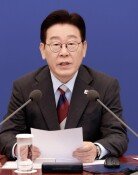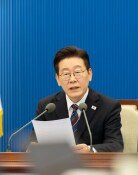President Hugo Chavez Might Face a Recall Vote
President Hugo Chavez Might Face a Recall Vote
Posted August. 29, 2003 23:42,
Can a president be recalled?
Much attention is being paid on whether the Venezuela president Hugo Chavez can stay in power as the nation`s Supreme Court newly appointed members of National Electoral Council or CNE on Monday, which will decide whether the recalling of the president will be put to a vote. The new CNE will compare the signatures in resident registration documents with those from voters who want a recall vote. The recall referendum can be held with requests from 2.4 million voters. If these requests are deemed legitimate, the referendum will be held at the end of November.
Anti-Chavez forces including the opposition party submitted last Wednesday signatures from 3.2 million people who want the recall vote. The Venezuelan constitution stipulates that a recall vote can be requested by voters after the halfway point of a president` term. If anti-Chavez votes in the recall referendum are more than 3.76 million votes Chavez got during his presidential election, then the vote of nonconfidence will be passed. President Chavez, who was elected with 60% of total votes, currently has approval ratings of 34%. But he is confident that a recall vote is not likely as most signatures for a recall vote are counterfeited or belong to the dead. More controversies are expected as there are no clear-cut rules on how to judge the validity of signatures, whether it`s possible to give one`s signature again when the signature was counterfeited and whether Chavez can run for a president again even after he is defeated in the recall vote.
Anti-Chavez groups say the mismanagement of the nation by the president has made the nation`s GDP in the first quarter drop by 29% and unemployment rise to 20%. They tried a failed attempt to oust the president last year and led a large-scale strike for 64 days earlier this year.
President Chavez, who was elected on the back of enormous support from the poor in 1998, met resistance from the vested interests with his socialist reform law. He was distanced from labor unions as he failed to replace labor unions by pro-government ones. Some say that the U.S, the largest consumer of Venezuelan oil, is trying to change the regime to have an easier access to the country`s oil. Indeed, the deputy speaker of the U.S. state department said in his statement that the new electoral council would be a peaceful, democratic and legal solution to the political crisis in Venezuela, which gave the impression that the U.S. wants regime change in Venezuela.
havefun@donga.com





![아침 공복 따뜻한 물 한 잔, 정말 살 빠지고 해독될까?[건강팩트체크]](https://dimg.donga.com/c/138/175/90/1/wps/NEWS/IMAGE/2026/03/05/133467930.3.jpg)

